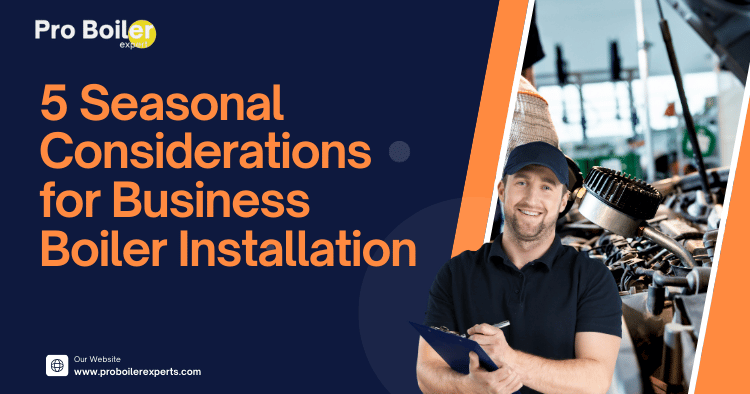Table of Contents
- Understanding Seasonal Demands
- Choosing the Right Time for Installation
- Weather Impact on Boiler Performance
- Maintenance Needs Across Seasons
- Energy Efficiency and Seasonal Changes
Installing a boiler for your business is a significant investment that requires careful planning and execution. However, many entrepreneurs overlook the seasonal considerations that can impact the efficiency and effectiveness of their boiler systems. In this article, we’ll delve into five crucial seasonal factors to keep in mind when planning your business boiler installation.
Understanding Seasonal Demands
Every business has different heating needs depending on the season. Understanding these demands is the first step in ensuring your boiler installation is successful.
- Winter: This is the peak season for heating demands. Businesses need a reliable boiler to maintain a comfortable environment for employees and customers. If you’re planning to install a boiler in the winter, ensure it’s done well in advance of the coldest months.
- Spring and Fall: These transitional seasons often see fluctuating temperatures. Businesses may require less heating, but they still need a reliable system that can adapt quickly.
- Summer: In some regions, summer might also require heating, especially in commercial settings like restaurants or warehouses where temperature control is crucial.
Tip: Investing in a modulating boiler can be particularly beneficial during transitional seasons, as it adjusts its output according to current heating needs.
FAQ: How do seasonal demands affect boiler selection?
Choosing the right boiler type can help meet these varying demands efficiently. For instance, a modulating boiler can adjust its output according to the current heating needs, which can be particularly beneficial during transitional seasons.
Choosing the Right Time for Installation
The timing of your boiler installation can significantly affect your operational efficiency and costs.
- Off-Peak Seasons: Late spring and early fall are generally considered the best times for installation. During these periods, heating demands are lower, which means contractors may offer better rates and availability.
- Holiday Considerations: If your business operations slow down during the holiday season, it might be an excellent time for installation. However, ensure you plan well in advance, as contractors often book up quickly near holidays.
Note: Planning your installation during quieter times can lead to cost savings and less disruption to your business operations.
Visual Element: Installation Calendar
| Month | Heating Demand | Best Installation Time |
|---|---|---|
| January | High | Not recommended |
| February | High | Not recommended |
| March | Decreasing | Possible |
| April | Low | Recommended |
| May | Low | Recommended |
| June | Low | Possible |
| July | Low | Possible |
| August | Low | Recommended |
| September | Increasing | Recommended |
| October | High | Not recommended |
| November | High | Not recommended |
| December | High | Not recommended |
FAQ: What if I need a boiler installed during peak season?
If you find yourself in need of a boiler during peak seasons, consider temporary heating solutions to manage your immediate demands while planning your installation.
Weather Impact on Boiler Performance
Weather conditions can greatly influence a boiler’s performance and efficiency.
- Cold Weather: Extremely low temperatures can strain your boiler, leading to higher energy consumption and increased wear. It’s essential to ensure that your installation includes proper insulation to minimize heat loss.
- Humidity: High humidity levels can affect the efficiency of your boiler. For businesses in humid climates, selecting a boiler designed to handle such conditions can make a significant difference.
Advice: Regular maintenance, such as checking the flue and ensuring proper insulation, can help prepare your boiler for extreme weather conditions.
FAQ: How can I prepare my boiler for extreme weather?
Regular maintenance, such as checking the flue, ensuring the boiler is properly insulated, and scheduling annual inspections, can help prepare your system for extreme weather conditions.
Maintenance Needs Across Seasons
Proper maintenance is key to extending the lifespan of your boiler and ensuring its efficiency, especially as seasons change.
- Winter Maintenance: Schedule pre-season checks to ensure your boiler is operating at peak efficiency. This includes checking for leaks, ensuring vents are clear, and testing safety valves.
- Spring Maintenance: After the winter season, it’s essential to clean the system and check for any wear and tear that may have occurred during the colder months.
- Summer Maintenance: While heating demands are low, take advantage of this time to conduct a thorough inspection, including checking the water levels and flushing the system.
Recommendation: Scheduling maintenance at least once a year can help you catch potential issues before they escalate.
FAQ: How often should I schedule maintenance?
It is recommended to have your boiler inspected at least once a year. However, businesses in harsh climates may benefit from bi-annual inspections.
Energy Efficiency and Seasonal Changes
Energy efficiency is a crucial concern for businesses looking to save on costs and reduce their environmental impact.
- Choosing Energy-Efficient Models: Look for boilers with high efficiency ratings. The U.S. Department of Energy provides a guide on how to choose energy-efficient heating systems.
- Seasonal Energy Efficiency Ratio (SEER): For businesses that rely heavily on heating and cooling, understanding the SEER rating of your boiler can help you choose a system that operates efficiently year-round.
- Adjusting Settings Seasonally: Many modern boilers come with programmable thermostats. Adjusting these settings according to seasonal needs can save you money on energy bills.
Insight: Energy-efficient boilers not only reduce costs but also contribute to a more sustainable business model.
FAQ: What are the benefits of energy-efficient boilers?
Energy-efficient boilers not only reduce your energy costs but also lower your carbon footprint, making them a sustainable choice for your business.
Conclusion
Considering seasonal factors when installing a boiler for your business can lead to improved efficiency, reduced costs, and a more comfortable environment for your employees and customers. By taking into account seasonal demands, timing your installation, preparing for weather impacts, maintaining your system, and focusing on energy efficiency, you can ensure that your investment pays off in the long run.
For more information on boiler installation and maintenance, check out the Boiler Warehouse or consult your local HVAC professional.
By keeping these seasonal considerations in mind, you’ll not only protect your investment but also create a safer, more comfortable environment for everyone involved in your business. Happy heating!





